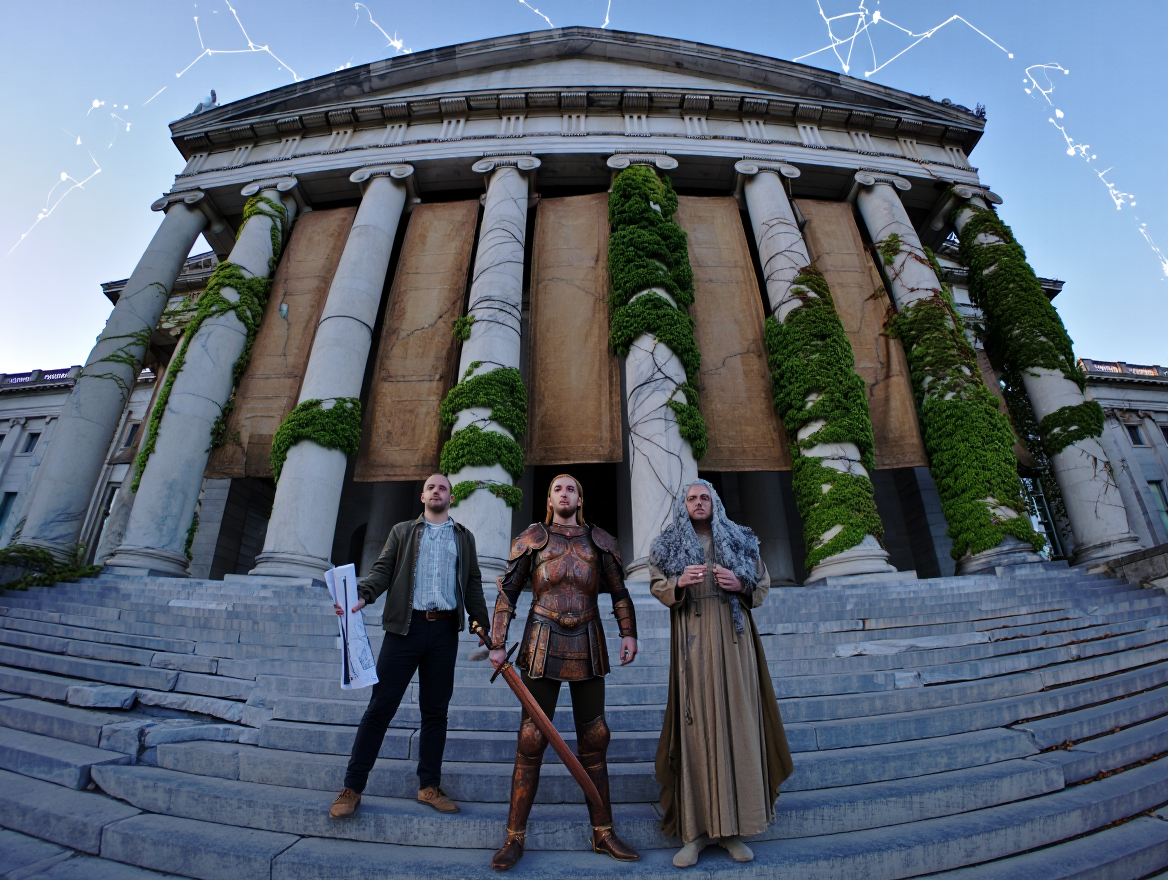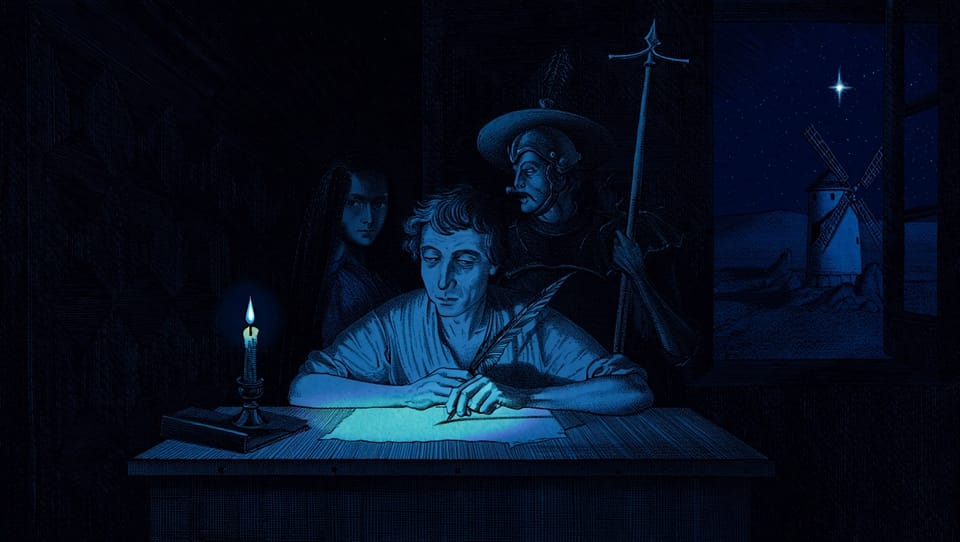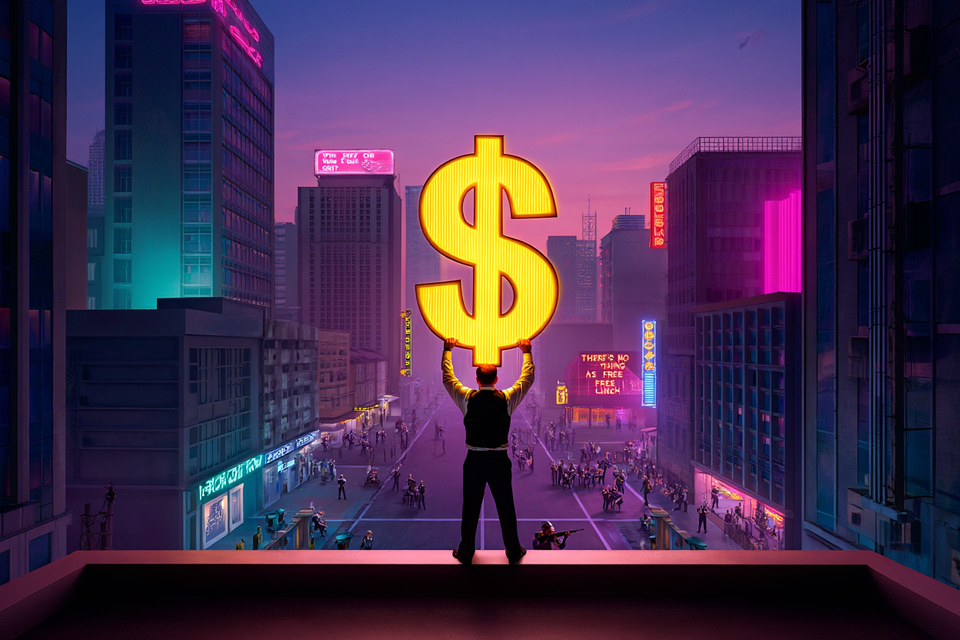The Consequences of Moral Sleepwalking
At the heart of the Republic’s Threshold of Covenant lies a moral fracture: liberty for me versus liberty for all. This is more than a crisis; it is a reckoning with memory, fear, and the deliberate choice to return to a story wide enough for us all-- or not.

THE ABYSS:
Where We Are Losing Our Way
A single figure looms at the edge of every April headline: the Tyrant‐King who bends rules to appetite. He surfaces with a threat to fire Jerome Powell, in a decree that newborns of the undocumented are non‑citizens, in the sudden ransom placed on Ukraine’s survival.
Across from him shiver two familiar foils. The Scapegoat—migrant families, queer soldiers, “deep‑state” civil servants—absorbs blame for plagues they did not cause.
And the Betrayed Ally, embodied this week by Kyiv, reenacts America’s on‑again‑off‑again promise of guardianship, echoing a promise made in 1778 when we begged France to believe we would not cut and run.
Ranged between Tyrant and victim stands the Guardian‑at‑the‑Gate: protesters filling boulevards, judges blocking executive whim, a central banker insisting that arithmetic matters more than thunder.
What, then, is failing? The foundational myth that a government “derives its just powers from the consent of the governed” stumbles when eleven million citizens shout Hands off! and still doubt they will be heard. The birthright fights reveal another fracture: the creed that American identity flows from soil and oath, not pedigree. When that creed is recast as an administrative loophole, we witness the crumbling of a covenant once thought unquestionable.
Collective anxiety flowers in three species: spectacle (cardboard guillotines, TikTok live‑streams from fifty capitals), policy (orders drafted at midnight to erase entire cohorts of infants), and silence (senators who deplore Ukraine’s plight in private yet mute their outrage on camera).
Symbolically exiled from the nation’s psyche are three things we cannot live without: the uncomplicated belief that citizenship is secure, the quiet competence of institutions, and the idea that alliances outlive the men who sign them. Stripped of these anchors, the public subconscious oscillates between carnival bravado and dread of abandonment.

What does this moment reveal about the soul of the Republic in crisis?
That it remains passionately alive—alive enough to feel shame, to crowd the streets, to sue its own government, to quote eighteenth‑century pamphlets in Reddit threads. Yet it is also disoriented, dislodged from the story that once turned conflict into purpose.
The soul gropes for narrative gravity while the abyss whispers, “Nothing holds.”
THE TRIAL:
What Our Conscience Must Decide
Two liberty paradigms clash beneath every podium microphone. Negative liberty—leave me unregulated—drives the president’s demand to manipulate the Fed and his insistence that he alone can judge which babies deserve papers. Positive liberty—the freedom that grows when everyone belongs—animates the 50501 marchers and the lawyers pleading for newborn citizenship. Threaded through both is ordered liberty, the constitutional operating system sustained by procedure, precedent, and patience.
The contradiction: a nation founded on universalist rhetoric is tempted, again, to carve exceptions in the name of expediency. “Protect the borders, protect the markets, protect the deal,” say executive memos, wielding safety as talisman.
But safety, when stretched to cover economic nerves and cultural panics, becomes an all‑purpose weapon: point it at Powell, point it at infants, point it at far‑off allies whose resistance inconveniences negotiations. Truth grows malleable; dignity becomes conditional; freedom is invoked without reciprocal responsibility—especially the responsibility to include those who cannot yet vote, lobby, or donate.
Fear choreographs the week’s public imagination. Inflation charts migrate from business pages to nightmares; drone clips of Ukrainian trenches flicker behind dinner‑table quarrels; parents of mixed‑status households rehearse contingency plans in case maternity wards become immigration checkpoints. The word “tyrant” and the phrase “existential threat” appear in newsfeeds a record number of times, algorithmically confirming that nerves outpace reason.
Amid this unease, a quieter current runs beneath the headlines: an imagined citizenry, forming in the shadows of policy and propaganda. Who is being cast in the role of the ideal American, and who is left out?
The preferred citizen, as implied by executive orders and populist rallies, is self‑financing, domestically rooted for generations, culturally conforming, economically nervous enough to obey, and politically pliable.
Who are the unpreferred citizens?
THE TURNING:
How We Begin to Return to Ourselves
Our way back begins with remembering that this is not the first time a president has menaced institutions (Jackson and the Bank, Nixon and the DOJ), nor the first attempt to dilute birth‑right (Chinese Exclusion, Dred Scott), nor the first temptation to barter allies (Hungary 1956, Vietnam 1975).
The memory worth recalling is that each prior lapse triggered a counter-story of renewal: Reconstruction amendments following Civil War betrayals, the War Powers Act after Vietnam, and the long congressional push to codify bank independence after 1971. We return to ourselves by admitting that every advance was once a reparation for moral sleepwalking.
Silence to break: the private admission– “I am exhausted by permanent crisis” must be spoken aloud, because democracy relies on citizens who can say enough before they collapse.
There is also a more profound hush: the unvoiced suspicion that some lives matter less. When a neighbor jokes that undocumented babies will “have to earn it like our ancestors did,” the silence that follows is complicity; breaking it—gently, firmly—begins the cultural exorcism of scapegoating.
The individual moral act is to choose one endangered covenant and honor it.
If monetary independence moves you, write a note of thanks to an anonymous Fed staffer and mail it—physical gratitude countering digital abuse. If citizenship is your alarm, volunteer to translate at a naturalization clinic. If alliances haunt you, donate frequent‑flier miles to reunite a deployed service member with family. Each gesture restitches a fibre in the shredded mythos.
What truth have we been avoiding in the name of belonging?
Perhaps that another’s precarity sometimes purchases our comfort; that inattentive cynicism can mimic sophistication. Scoffing at alarmists is easier than auditing the structures that we benefit from. To confront these truths is to loosen the Tyrant’s grip on the inner republic, making room for a steadier loyalty than fear can supply.
CODA:
A Thin Light Over the Abyss
We will not banish archetypes; Tyrant and Scapegoat walk every era.
But we decide whether they write the ending. The moment we remember forgotten citizens, thank unglamorous guardians, and keep faith with distant friends, the abyss narrows. Protesters, jurists, bankers, soldiers—each bears part of the national soul. Their tasks differ, but their crisis is one.
The Turning asks only that we notice, choose, and act before the wheel comes round again and memory must pay twice for lessons once learned.



